Australian law enforcers reveal the criminals COVID-19 created
Spies, cops and courts reveal their behind-the-scenes fight against COVID-19 and the criminals it created.
Crime in Focus
Don't miss out on the headlines from Crime in Focus. Followed categories will be added to My News.
We were stuck at home, couldn’t dine and drink at our favourite pub and moaned about having to wear a mask or not being able to go about our daily outdoor rituals.
But in the past 10 months in the fog of COVID-19, the pandemic was and still is having a profound effect on how our cops, courts and spies are moving to keep the nation safe.
A series of agency reports tabled to federal parliament reveal despite the pandemic, threats and dangers to society escalated forcing national security and law enforcement to unprecedented levels of operation.
And while state police, health officials and the Australian Defence Force were the high-profile combatants of the virus there were thousands of others working behind the scenes to maintain civil society.
These are some of their stories.
AUSTRALIAN SECURITY INTELLIGENCE ORGANISATION (ASIO)
According to the domestic spy group’s pandemic summary, COVID-19 did not diminish the threat of terrorism and furthered the cause of Islamic State (IS) in the last six months, with propaganda specifically targeting younger people as “social isolation increasingly pushed Australians online”.
al-Qaeda also remained active, buoyed by the fact in the next five years Australia’s prisons will release several extremists whose actions they inspired.
COVID-19 also created other issues including sleeper Right Wing extremists and conspiracy theorists.
“The COVID-19 pandemic has been used by right-wing and issue-motivated extremists to promote their views. They are seeking to exploit social and economic dislocation; and their extremist ideology has been spreading more quickly and widely as Australians spend more time online engaging with like-minded individuals. However, calls for violence and sabotage have not yet been acted on in Australia.”
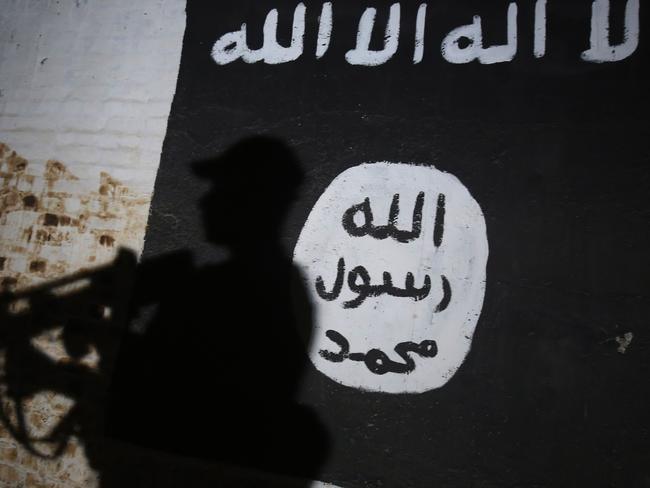
It added: “Many of these groups and individuals have seized on COVID-19, believing it reinforces the narratives and conspiracies at the core of their ideologies. They see the pandemic as proof of the failure of globalisation, multiculturalism and democracy, and confirmation that societal collapse and a ‘race war’ are inevitable.”
The pandemic “suppressed demand” for illegal migration as borders remained largely closed.
Espionage and foreign interference (EFI) was not suppressed and increased Australia’s exposure to a range of hostile cyberspace actors including direct threats to “Australia’s political democratic systems, institutions and processes; Australia’s tertiary sector; and social cohesion across Australian communities”.
“COVID-19 required an immediate response by ASIO across the breadth of our work. We adapted operational practices to provide security advice to government on attempts to target Australia and its interests, including by individuals using the crisis to their advantage.”
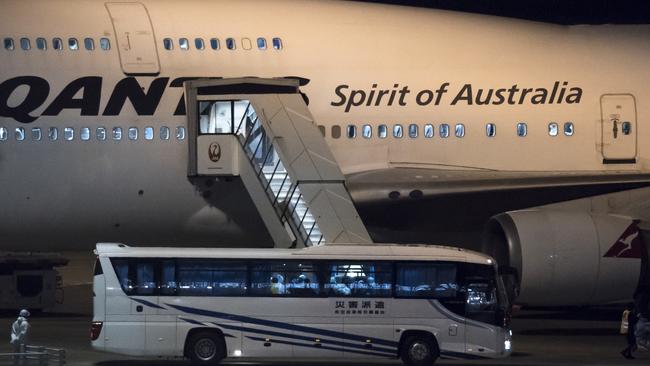
AUSTRALIAN FEDERAL POLICE (AFP)
While state police and the Australian Defence Force were the high-profile law enforcers of COVID-19, behind the scenes the AFP initiated one of the biggest multi-tasked series of operations in its history.
It assisted key partner agencies to evacuate 713 Australians from Wuhan, China under Operation Burdei, 170 trapped in Japan on the Diamond Princess cruise ship and deployed personnel around the country in response to the pandemic (Operation Protect).
At its peak, 400 AFP members worked on COVID-19 matters across Australia including helping more than 65,000 Australians who were returning from overseas and going into hotel quarantine.
It even had to deploy to Centrelink offices at shopping centres and supermarkets and state borders as panic set in.
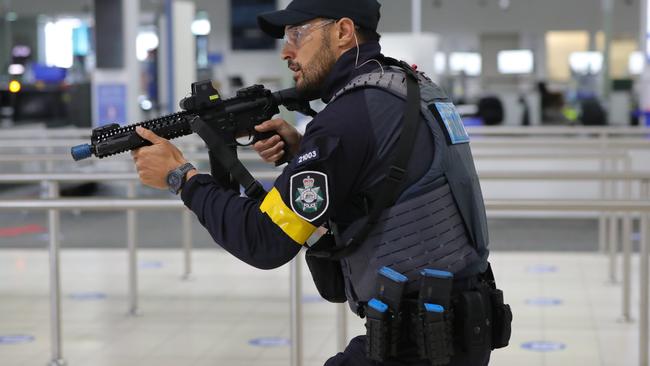
It had to launch Operation Bowmore Aqua to specifically combat emerging cyber-enabled fraud relating to the Federal Government’s COVID-19 stimulus response packages.
This included Task Force Iris investigations into superannuation fraud.
The matter is still under investigation, but so far 107 victims have been identified and the value of the fraud has exceeded $1 million, with 166 false name bank accounts with funds totalling $226,044 found.
“Even during national emergencies such as the recent bushfires and COVID-19, scammers have been seeking opportunities. Over the past year scammers sought to access bank account details by sending emails pretending to sell COVID-19 products online or relay testing advice from the government. Scammers have even made phone calls to potential targets pretending to be from the World Health Organisation.”
The AFP also successfully facilitated the delivery of more than 1.9 million surgical face masks into Australia to kit their officers and those from State police forces.
COVID-19 also prompted the creation of a permanent AFP Reserve force of 200 personnel.
“The COVID-19 emergency posed the greatest challenges and has had the most impact to date,” AFP commissioner Reece Kershaw concluded.
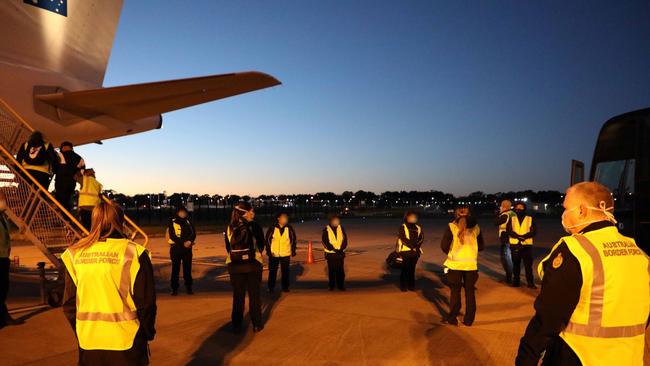
DEPARTMENT OF HOME AFFAIRS
Responsible for maintaining Australia’s “prosperity, security and unity” through critical services delivery, the portfolio including Australian Border Force played a pivotal role during COVID-19 and ran the government’s National Coordination Mechanism (NCM) to co-ordinate non-health-related planning and responses.
This including establishing the Supermarket Task Force to ensure food supply chain and domestic security. The ABF increased deployments to air and sea ports.
“The ABF’s response to the COVID-19 pandemic, primarily through the rapid implementation of Australia’s border controls, has been a critical factor in slowing the introduction and spread of the virus throughout Australia. Given Australia’s geographical proximity to the outbreak, it was those early decisive actions that have put us in a much stronger position than other nations around the world.”

Critically like AFP, it brought people home but also saw the departure of all 32 international flagged cruise ship vessels and their 20,000 crew from Australian waters in March and April and prompted charter planes to remove criminal foreigners.
It engaged with the chiefs of Australia’s critical infrastructure to enable cross sector engagement and gave weekly crisis co-ordination briefings.
Under Operation Battenrun, the ABF continued to target unscrupulous foreign worker labour hire groups exploiting the diminished foreign work force.
“The COVID-19 pandemic and the 2019–20 bushfires demonstrated that threats can have unexpected impacts across multiple sectors of society, with cascading consequences for our security and sovereignty,” it concluded.
COMMONWEALTH DIRECTOR OF PUBLIC PROSECUTIONS (CDPP)
Jury trials initially ceased in many jurisdictions, forcing the federal legal practice to provide core prosecution services remotely via video conferencing facilities where possible for mentions, bail, pleas and sentences and in appeal matters.
There had also been an increased focus on engaging early with defence legal teams “with a view to reaching agreement where possible or appropriately resolving matters”.
COVID-19 “impacted” the Commercial, Financial and Corruption (CFC) arm to combat high level and complex white collar fraud including serious financial crimes, focusing on offences involving corporations, financial markets and services, large-scale tax fraud, criminal cartel conduct and bribery and corruption of Commonwealth officials.
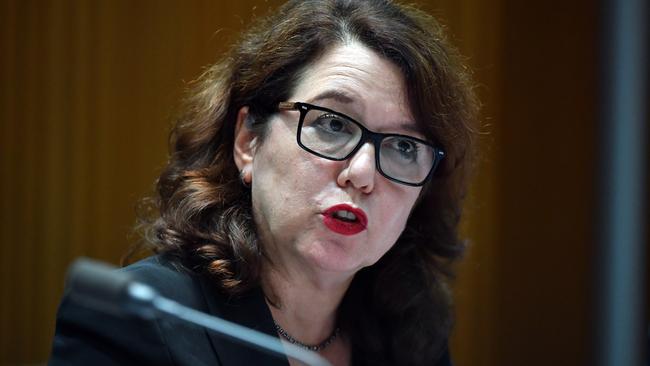
“The restrictions have primarily impacted on the conduct of contested trials in all courts, resulting in many of those cases being adjourned. However, other cases have continued, such as appeals and sentencing hearings, with these often being conducted by way of video conferencing technology.”
The virus also delayed the finalisation of a number of significant Organised Crime and Counter Terrorism (OCCT) division cases responsible for the prosecution of terrorism offences, large-scale organised crime matters and offences relating to the national security.
“While our prosecutors are working closely with partners and stakeholders online to keep as many cases as possible moving through the criminal justice system, the conduct of longer and more complex criminal jury trials at a time of physical distancing continues to present a challenge for our criminal justice system. Further delay in the finalisation of these matters seems likely.”
AUSTRALIAN CRIMINAL INTELLIGENCE COMMISSION (ACIC)
ACIC intelligence analysts, forced to work from home, were pushed to limits as serious and organised fraud targeted coronavirus stimulus programs like Job Keeper created by the Federal Government. The intel group switched its Waste Water focus to look at COVID-19 virus in our waste nationally to assist the government in modelling its spread. It also provided frontline reporting on virus related cybercrime and dark web targeting households.
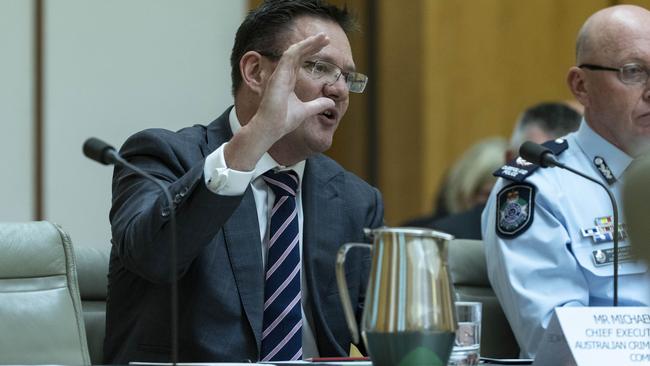
During this time 208 previously unknown criminal targets were discovered, six potential new Australian Priority Organisation Targets (APOTs) added to a national list of 16, five other APOTs disrupted to the point that they are no longer considered national level threats.
“The ACIC will continue to focus on making Australia hostile to criminal exploitation,” ACIC CEO Mike Phelan said. “The way that we responded to the challenges of the past year has only bolstered my confidence in our agency’s ability to deliver on these commitments and provide a service of value to our law enforcement and intelligence partners.”
MORE NEWS
Asian criminals’ COVID-19 comeback
